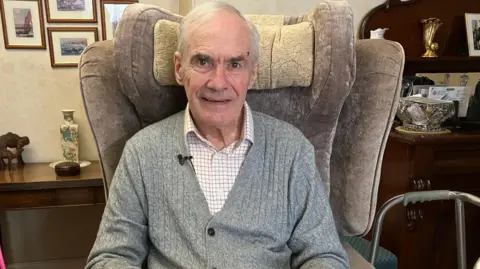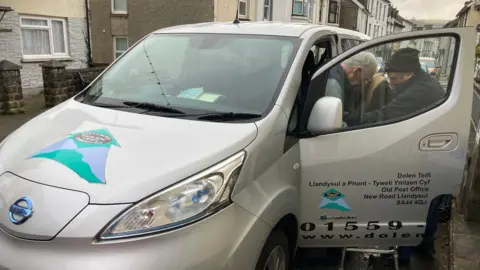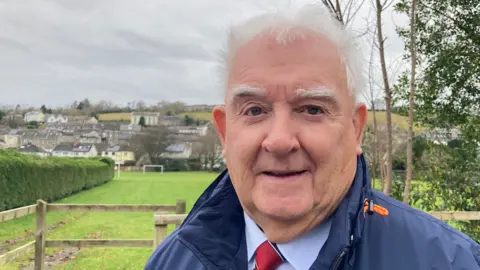'We'd be lost without help getting us to hospital'
 BBC News
BBC NewsFor husband and wife John and Joan, the drivers who take them to hospital through rural Wales are a lifeline.
The couple are reliant on the community transport scheme to ferry them the almost 40 miles (64km) to 86-year-old John's regular appointments, and deliver them back home again.
Dolen Teifi in Ceredigion said it was helping more people get to hospital than ever before, and blamed the lack of transport in rural areas.
The Welsh government said it was committed to improving bus services, and transport was available for patients "needing to get to non-emergency appointments who have a specific medical need".
John and Joan Barrington Powell need to go often to Prince Philip Hospital in Llanelli, Carmarthenshire, from home in Llandysul, Ceredigion, with each journey lasting more than an hour.
"Since the bus services got worse, we have to use them [Dolen Teifi]," he said. "It's either that or a private taxi which would be more expensive."
A Dolen Teifi driver collects the couple, takes them to Llanelli and waits until the appointment is finished before returning them home.
Both said they could not manage without the service.
"At one time we used the ambulances, but we couldn't rely on them and Joan has to come with me and she couldn't go on the ambulances," he said.
While ambulances are available to take patients to health appointments, only the patient can travel.
"I can't use my hands to feed myself or do things," said John. "Joan has to do that, so she has to come with me."
 BBC News
BBC News BBC News
BBC NewsThis year Dolen Teifi has made nearly 50,000 journeys, of which 10,000 were for health reasons. But it was unable to undertake more than 2,000 requests in the year, and half of those were to do with health.
John Hands, one of its 783 volunteer drivers, said: "Since they've cut the buses over the years, the demand for this kind of transport has gone up."
He has been volunteering with Dolen Teifi for more than 20 years, travelling across Ceredigion, Carmarthenshire and Swansea. He said that now most of his journeys were hospital appointments, including John and Joan's trips to Prince Phillip Hospital.
"I feel that I'm getting a bit tired, and also the demand is increasing all the time."
"I think the NHS should be paying for us to come and collect John, to take him to see a specialist, because for John to use this vehicle today, I reckon it's going to cost him something in the region of about £50."
'Nearly a million journeys a year'
The Community Transport Association (CTA) said the demand had increased across Wales.
"We know that our members are delivering nearly a million journeys a year and more than 60% of those journeys go to a health destination," said Gemma Lelliot, director of CTA Wales, which wants people with bus passes to have a discount on community transport.
"Community transport has always fallen in between the cracks, it's not considered to be part of health and social care," she said.
"It's not considered to be part of the mainstream transport network and so there isn't that core funding element for it."
 BBC News
BBC NewsKeith Evans, a councillor and director of volunteer-run not-for profit company Llandysul Pont Tyweli Ymlaen, said people "hardly see" buses in the Llandysul area.
"With the cutbacks that we've had in the budget, the austerity over the last decade and more, we're losing more of our normal bus services," he said.
Ceredigion had a high proportion of elderly people, "and they cannot get to their appointments, be it doctor, specialist, surgeries or go to hospital appointments," he added.
A Welsh government spokesperson said non-emergency transport was available for patients with a specific medical need, with planning and funding down to the NHS Wales Joint Commissioning Committee.
It also said a new bus Bill to be brought forward in the Senedd would "put people before profit".
"To help smooth the transition towards bus franchising we've invested £64m this year to make improvements to our existing networks first."
